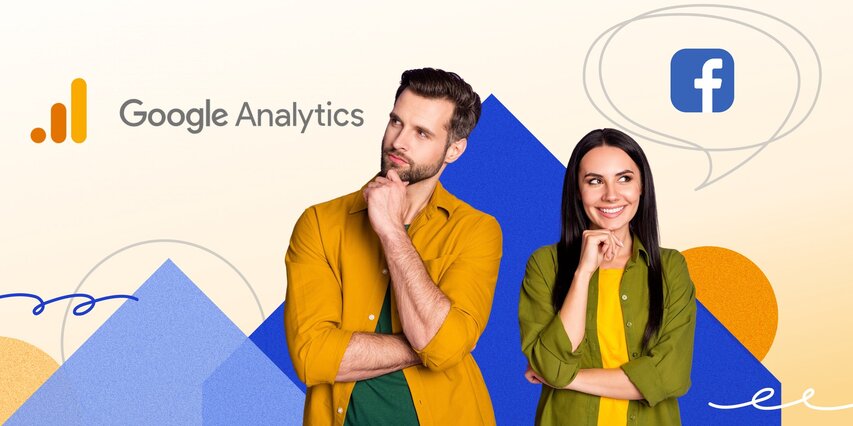Have you looked at your advertising results in Google Analytics and noticed that those numbers do not match your Facebook data? Are you considering which channels you even need to use? Broadening your perspective pays off in advertising too; your activities should comprise a detailed patchwork.
The choice of elements is wide: posts and competitions on social media, video spots, cooperation with influencers, and many more. Identifying your key items may take some time, and you have likely asked yourself whether paid campaigns on Facebook and Instagram belong to them–especially if their results in Google Analytics do not look satisfactory.
Number are not everything (if you are looking at one source only)
Facebook data can differ rampantly from those shown in Google Analytics (abbreviated as GA). Maybe you have already wondered why visits in GA do not match the number of clicks in Facebook Business Manager (FBM). Even more likely you are bothered by FBM showing more sales and bigger revenue, which you cannot see in GA or you see it attributed to direct traffic, organic search, or another channel. These differences are often substantial, and their correct interpretation is vital in order for you to create a good strategy.
The truth is that these numbers will never completely match, no matter how much you try. The reason behind the different data is that each system uses different approach to information processing. Seeking reality in these numbers may be difficult because even though GA displays all your sales channels together, basing your decisions only on these data will deprive you of a wider perspective on your social media strategy.
Sessions or clicks?
The first reason for confusion may be understanding the difference between sessions in GA and clicks in FBM. GA records when someone clicks on your ad and proceeds to visit your site as a Session. FBM counts every interaction, such as a like, comment, or share, with a metric called Clicks (all). These are important for your brand strategy, but you cannot see them in GA at all. This applies to the integrated Instagram too because FBM shows data for all placements on Facebook and Instagram together.
But what if you see differences also with Link clicks, which should measure only outward clicks on Facebook and Instagram? These further differences can occur due to duplicate records. If a user clicks on your ad multiple times within 30 minutes, Facebook records every one of these clicks, while Analytics considers it to be one visit.
How these systems recognize users
Another crucial difference between these systems is the method of identifying your customers. GA needs cookies for it, so if a user rejects cookies on your website or deletes them afterwards, their behavior will not be monitored in GA. Also, if they change devices, GA will not be able to pair their actions. So if a user starts their journey on a computer and finishes the transaction on a mobile device, you will not see the whole data in GA.
On the other hand, Facebook requires its users to be logged in, so it can track a user within multiple devices and browsers. Because it uses primarily the user ID instead of cookies for identification, FBM can offer you interesting purchase data. According to Facebook, 65% of conversions start on one device and end on another.
Attribution models magic explained
When a user converts, FBM automatically assigns it to the ad they had seen or interacted with. So if someone has seen your story and later decided to come to your website from a search engine and make a purchase, you will see this conversion in FBM data. However, GA will not record this; the sale will be attributed to organic search.
Google Analytics uses the Last Non-Direct Click attribution model; therefore, a purchase is attributed to the last interaction except when a user puts your shop’s URL directly to the address bar. However, Facebook does not care about the journey. By default, it records any conversion made within seven days after clicking on your ad or one day after seeing it.
Facebook brings you customers
How to handle this? Maybe you have experienced going to a brick-and-mortar store with the intention of trying on sneakers to later order them online. The transaction went through smoothly, the company gained profit. This is how a relationship between your Facebook and Google Analytics data looks like. Facebook is a social network; it helps with brand building and provides inspiration, including shopping ideas. Your potential customers notice a product which they remember, but the purchase itself is not done right after leaving the social network. They search for and buy the item later. However, they likely would not have done that without the previous inspiration.
We already wrote about the benefits of advertising on Facebook and Instagram. Maybe you consider simplifying your data analysis by changing the default attribution window in FBM to a stricter alternative (for example, it is possible to choose one day after clicking) or even ignoring the FBM data completely. But each system has its own approach for a good reason. Facebook is trying to communicate its effectiveness in its own way, which is not a bad thing since the impact of your brand strategy is hard to measure, and if you do not pay attention to it, you may easily regret it soon.
Facebook provides a very intuitive environment, and that prompts some advertisers to rely on themselves and their skills. Everyday users then end up setting up campaigns. But more often than not, they do not have the necessary experience, and that is why it is important to talk to a professional; even a small mistake costs you resources. Afterall, you would not let a new driver repair your car, right?












